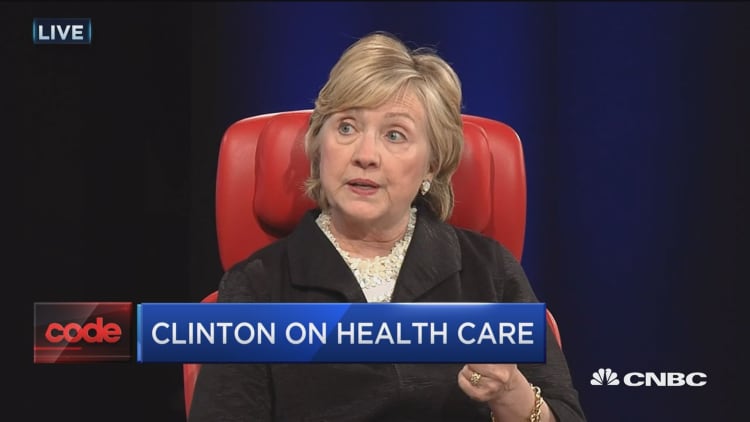The only thing that can save the GOP from being sunk by its Obamacare repeal is the Democrats' embrace of a single-payer scheme.
Health care was the making of the current Republican congressional majorities and a key factor in Donald Trump's victory. But with the GOP sinking under the weight of its unpopular efforts to repeal and replace the Affordable Care Act, it could well become the factor that breaks the party. Unless, that is, Democrats save Republicans from themselves by following the Bernie Sanders wing of their party off the proverbial cliff.
More from the National Review:
It's the hypocrisy, stupid
The key charade of the Paris agreement
Can't Wonder Woman just be Wonder Woman?
At the moment, members of the Republican caucus are behaving pretty much the same way Democrats did in 2010. They are shunning town-hall meetings lest they get tarred and feathered by angry constituents. With the party divided between those who think the repeal goes too far and those who think it doesn't go far enough, the issue has become a cudgel that Democrats are using to their advantage. As the 2018 election cycle approaches, that problem may only get worse. This time, it could be Republicans who will have to defend an unpopular bill and who will be blamed for rising insurance premiums — even if, as they will argue, the collapse of Obamacare is the fault of its architects rather than those who wish to undo it. The result could be a stunning reversal of fortune that puts Nancy Pelosi back in the speaker's chair.
Anger about the passage of Obamacare helped Republicans take control of the House of Representatives in 2010. Then, in 2014, the shaky rollout of the Affordable Care Act and the realization that President Obama was lying when he promised many times that consumers could keep their plans and doctors if they liked them helped the GOP take the Senate. And though their repeated futile attempts to repeal the law while Obama was in the White House got them nowhere, the slow-motion collapse of the law ensured that it remained unpopular.

But along with the spoils of victory comes the responsibility of governing. While the "burn it down" spirit of the Tea Party bolstered the GOP in opposition, it is of little use to a party that, whether it likes it or not, now owns the problem Obama left for them.
The basic political problem of Obamacare wasn't so much that it made government responsible for the one-sixth of the American economy that is the health-care industry. Rather, it was that — unlike other historic attempts by the Democratic party to expand entitlements such as Social Security and Medicare — it adversely affected the lives and the pocketbooks of a large portion of the American electorate. It was the voices of those losers under Obamacare that sounded the loudest as Republicans won the 2010 and 2014 midterms. But once they got the chance to do what they've been talking about for seven years, Republicans found they had no palatable answer to the question of how to handle the millions of Americans who had benefited from Obamacare. It is that group that is now hounding Republican members of the House and Senate and giving confidence to a Democratic party that hit bottom last fall when it unexpectedly lost the presidency to Trump.
The GOP's built-in advantages in House races, together with the large number of Senate Democrats (including many in red states carried by Trump) facing re-election, mean that the math still favors Republicans in 2018. But the party is facing the possibility that their recent midterm magic is about to disappear. Driven by anger over everything Trump does and stands for, and spooked by the prospect of a new health-care law that will be every bit as messy as Obamacare, a Democratic wave next year is now a possibility.
But the Democrats are, as they proved in 2016, a party fully capable of seizing defeat from the jaws of victory. And if a Sunday New York Times front-page feature is any indication, they might be about to do just that.
According to the Times, Democrats are not content to merely oppose Republicans' ham-handed efforts to overturn or fix Obamacare. The rising tide of "resistance" against Trump has created a pronounced tilt to the left among Democrats. As was obvious last year, it is hard-core left-wingers such as Bernie Sanders and Elizabeth Warren who speak for Democratic activists, not more mainstream figures like last year's loser, Hillary Clinton.
Democrats are increasingly speaking up in favor of expanding government control of health care rather than merely preserving the current situation.
That means Democrats are increasingly speaking up in favor of expanding government control of health care rather than merely preserving the current situation. Support among liberal Democrats for a single-payer system is no longer an ideal to be longed for but a nonnegotiable demand. It is probably a given that whoever the Democrats nominate for president in 2020 will support a universal health-care system. Unions, which are still the shock troops of the Democrats, are now openly calling for their party to back some form of socialized medicine — and they are getting a hearing.
No one on the left has a plausible plan for paying for this vast expansion of a federal entitlement or any clear idea of how to deal with the havoc it would cause, but that isn't stopping Democrats from embracing a measure that goes far beyond what President Obama forced down the country's throat on a party-line vote in 2010.
Democrats know that they are riding a wave of sympathy for the idea of universal health care. After all, late-night host Jimmy Kimmel's pleas to ensure that all are covered went viral last month. But there is a difference between getting rid of or reforming an existing entitlement (the GOP's goal) and supporting socialized medicine. And that's where, amid the current Republican turmoil on Obamacare, hopes for a GOP recovery begin.
At this point, beset by their seeming inability to govern and by Trump's shortcomings, Republicans have lost the focus they had in previous midterms. They know that running for re-election while defending a repeal-and-replace law that even most of their own voters don't like could be a death wish outside of the deepest red districts and states. But running against a single-payer system and socialized medicine is the potential cure for all that ails the GOP.
If the Democratic base bullies swing-district Democrats into backing a single-payer system, they will be throwing away the advantage that the Republicans' health-care-legislation problems have handed them. Liberals might believe that history is on their side, with the backlash against Obamacare being merely a bump on the road to the inevitable adoption of universal health care. But running on such a platform is the one thing that could revive a dispirited conservative base and cause it to turn out in the kind of numbers that won Congress for the Republicans. Instead of a historic opportunity to fulfill their liberal dream, single payer health-care could be the formula that ensures the GOP will hold the House in 2018.
Commentary by Jonathan S. Tobin, the opinion editor of JNS.org and a contributor to National Review Online. Follow him on Twitter @jonathans_tobin.
For more insight from CNBC contributors, follow @CNBCopinion on Twitter.
Watch: The growing fake news bubble for liberals


